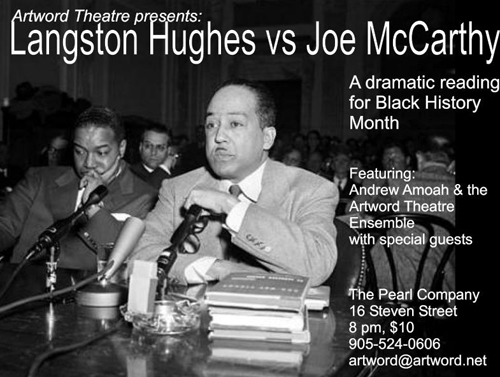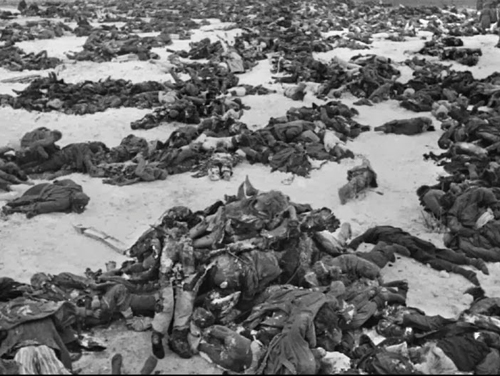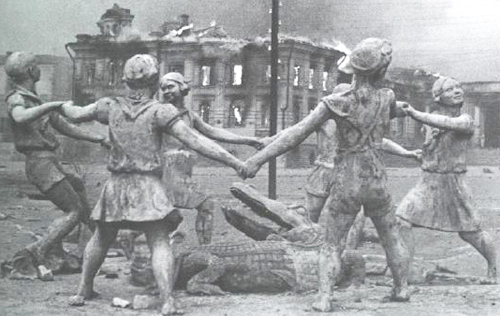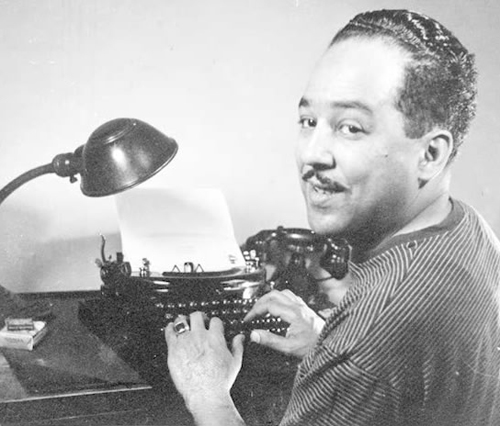BLACK HISTORY MONTH LESSON PLAN: Langston Hughes birthday another chance to appreciate the complexity of one of America's most prolific writers, poets, and activists
Here is a Langston Hughes trivial question. Why isn't the phrase "But you ain't dead!" from a famous Langston Hughes poem as famous as, say, that "Raisin in the Sun" line? The 112th anniversary of the birth of one of America's most talented and prolific poets, writers and activists -- Langston Hughes -- also gives us the opportunity to put into the historical record for Chicago's Black History Month a bit more than the oversimplifications that have dominated the Black History Month agenda in Chicago for as long as most of us can remember.
 Although some revisionists historians have tried to claim that Langston Hughes was simply a "socialist" (despite the year he spent in the Soviet Union and his dozens of poems praising Communism), there is no reason for 21st Century children to utilize evasive obfuscations about history.So before a thousands classrooms echo with all that "Raisin in the Sun" stuff (which is fine, in context and with respect for the vast career of the man), let's mark February 1 (the anniversary of Hughes's birthday) and February 2 (the anniversary of the important victory for human freedom at Stalingrad, about which Hughes wrote a major poem) with the poem Hughes published in the March 1943 issue of the New Masses to celebrate the victory of the Red Army over the Nazis' Sixth Army in the Battle of Stalingrad. It was on February 2, 1943 that Nazi General Paulus formally sat across the table from the Red Army commanders (although he refused to use the word "surrender", possible because his assistant, a general named Schmidt, was sitting beside him?)... Those who wish more about that piece of history can easily find it, with some Paulus stuff beginning on You Tube at http://www.youtube.com/watch?v=_6w6F0gFzaw.
Although some revisionists historians have tried to claim that Langston Hughes was simply a "socialist" (despite the year he spent in the Soviet Union and his dozens of poems praising Communism), there is no reason for 21st Century children to utilize evasive obfuscations about history.So before a thousands classrooms echo with all that "Raisin in the Sun" stuff (which is fine, in context and with respect for the vast career of the man), let's mark February 1 (the anniversary of Hughes's birthday) and February 2 (the anniversary of the important victory for human freedom at Stalingrad, about which Hughes wrote a major poem) with the poem Hughes published in the March 1943 issue of the New Masses to celebrate the victory of the Red Army over the Nazis' Sixth Army in the Battle of Stalingrad. It was on February 2, 1943 that Nazi General Paulus formally sat across the table from the Red Army commanders (although he refused to use the word "surrender", possible because his assistant, a general named Schmidt, was sitting beside him?)... Those who wish more about that piece of history can easily find it, with some Paulus stuff beginning on You Tube at http://www.youtube.com/watch?v=_6w6F0gFzaw.
The Langston Hughes library and material is so vast that a child beginning today might make a career out of the study of this one American poet, writer, activist and human being. (But then that child would not be doing much test prep and might not get accepted into a selective enrollment high school or Harvard..)...
Here is the Langston Hughes poem "Good Morning, Stalingrad!"
 February 2, 1943 is recognized as the official date of the surrender of the Nazi Sixth Army to the Red Army at Stalingrad. The Sixth Army began with more than 300,000 men when it arrived at Stalingrad in August 1942. By February 1943, about 90,000 were left to become prisoners. Few returned to Germany after World War II ended. Goodmorning, Stalingrad!
February 2, 1943 is recognized as the official date of the surrender of the Nazi Sixth Army to the Red Army at Stalingrad. The Sixth Army began with more than 300,000 men when it arrived at Stalingrad in August 1942. By February 1943, about 90,000 were left to become prisoners. Few returned to Germany after World War II ended. Goodmorning, Stalingrad!
Lots of folks who don�t like you
Had give you up for dead.
But you ain�t dead!
Goodmorning, Stalingrad!
Where I live down in Dixie
Thinkgs is bad �
But they�re not so bad
I still can�t say,
Goodmorning Stalingrad!
And I�m not so dumb
I still don�t know
That as long as your red star
Lights the sky,
We won�t die.
Goodmorning Stalingrad!
You�re half a world away or more
But when your guns roar,
They roar for me �
And for everybody
who want to be free.
Goodmorning Stalingrad!
Some folks try to tell me down this way
That you�re our ally just for today.
That may be so � for those who want it so.
But as for me � you�re my ally
Until we all free.
Goodmorning Stalingrad!
When crooks and klansmen
Lift their heads and things is bad,
I can look way across the sea
And see where simple working folks like me
Lift their heads, too, with gun in hand
To drive the fascists from the land.
You�ve stood between us well,
Stalingrad!
The folks who hate you�d
Done give you up for dead �
They were glad.
But you ain�t dead!
And you won�t be
As long as I am you
And you are me �
For you have allies everywhere,
All over the world, who care.
And they
Are with you more
Than just today.
 One of the few things to survive the period from August 1942 through February 1943 at Stalingrad was the sculpture above, shown in a photo taken during the battle (see the building burning in the background). Listen! I don�t own no radio �
One of the few things to survive the period from August 1942 through February 1943 at Stalingrad was the sculpture above, shown in a photo taken during the battle (see the building burning in the background). Listen! I don�t own no radio �
Can�t send no messages through the air.
But I reckon you can hear me,
Anyhow, away off there.
And I know you know
I mean it when I say,
(Maybe in a whisper
To keep the Klan away)
Goodmorning, Stalingrad!
I�m glad
You ain�t dead!
GOODMORNING, STALINGRAD!
For the record (thanks to Wikipedia and other sources)
"James Mercer Langston Hughes (February 1, 1902 � May 22, 1967) was an American poet, social activist, novelist, playwright, and columnist. He was one of the earliest innovators of the then-new literary art form called jazz poetry. Hughes is best known as a leader of the Harlem Renaissance. He famously wrote about the period that "the negro was in vogue" which was later paraphrased as "when Harlem was in vogue".
According to Wikipedia, "Both of Hughes' paternal great-grandmothers were African-American and both of his paternal great-grandfathers were white slave owners of Kentucky. According to Hughes, one of these men was Sam Clay, a Scottish-American whiskey distiller of Henry County and supposedly a relative of Henry Clay, and the other was Silas Cushenberry a Jewish-American slave trader of Clark County."
Hughes's maternal grandmother Mary Patterson was of African-American, French, English and Native American descent. One of the first women to attend Oberlin College, she first married Lewis Sheridan Leary, also of mixed race. Lewis Sheridan Leary subsequently joined John Brown's Raid on Harper's Ferry in 1859 and died from his wounds."
"In 1869 the widow Mary Patterson Leary married again, into the elite, politically active Langston family. Her second husband was Charles Henry Langston, of African-American, Native American, and Euro-American ancestry. He and his younger brother John Mercer Langston worked for the abolitionist cause and helped lead the Ohio Anti-Slavery Society [6] in 1858. Charles Langston later moved to Kansas, where he was active as an educator and activist for voting and rights for African Americans.[4] Charles and Mary's daughter Caroline was the mother of Langston Hughes."
Langston Hughes was born in Joplin, Missouri, the second child of school teacher Carrie (Caroline) Mercer Langston and James Nathaniel Hughes (1871�1934). Langston Hughes grew up in a series of Midwestern small towns. Hughes's father left his family and later divorced Carrie, going to Cuba, and then Mexico, seeking to escape the enduring racism in the United States.
"After the separation of his parents, while his mother traveled seeking employment, young Langston Hughes was raised mainly by his maternal grandmother, Mary Patterson Langston, in Lawrence, Kansas. Through the black American oral tradition and drawing from the activist experiences of her generation, Mary Langston instilled in her grandson a lasting sense of racial pride. He spent most of his childhood in Lawrence, Kansas. After the death of his grandmother, he went to live with family friends, James and Mary Reed, for two years. In Big Sea he wrote, "I was unhappy for a long time, and very lonesome, living with my grandmother. Then it was that books began to happen to me, and I began to believe in nothing but books and the wonderful world in books � where if people suffered, they suffered in beautiful language, not in monosyllables, as we did in Kansas".
 Langston Hughes learned his "keyboarding" skills at a public high school in Cleveland, where he worked on the school newspaper in the days before corporate school reform abolished school newspapers. "Later, Hughes lived again with his mother Carrie in Lincoln, Illinois. She had remarried when he was still an adolescent, and eventually they lived in Cleveland, Ohio, where he attended high school."
Langston Hughes learned his "keyboarding" skills at a public high school in Cleveland, where he worked on the school newspaper in the days before corporate school reform abolished school newspapers. "Later, Hughes lived again with his mother Carrie in Lincoln, Illinois. She had remarried when he was still an adolescent, and eventually they lived in Cleveland, Ohio, where he attended high school."
While in grammar school in Lincoln, Hughes was elected class poet. Hughes stated that in retrospect he thought it was because of the stereotype that African Americans have rhythm.[14]
"I was a victim of a stereotype. There were only two of us Negro kids in the whole class and our English teacher was always stressing the importance of rhythm in poetry. Well, everyone knows, except us, that all Negroes have rhythm, so they elected me as class poet."
During high school in Cleveland, he wrote for the school newspaper, edited the yearbook, and began to write his first short stories, poetry, and dramatic plays. His first piece of jazz poetry, "When Sue Wears Red", was written while he was in high school.
And lots more that is now available thanks to the Internet.
Happy Black History Month to the new generation of Resistance fighters in the USA in honor of those who plowed the prairies and built the cities where they trade in generations before us.
THIS ARTICLE WILL BE CONTINUED. PLEASE SEND YOUR MEMORIES OF LANGSTON HUGHES, ESPECIALLY HIS INFLUENCE IN CHICAGO, TO GEORGE N. SCHMIDT AT Gnschmidt@aol.com.


By: BrandonBag
drug awareness programs
houston mold remediation https://forums.dieviete.lv/profils/127605/forum/ herbal breast enlargement